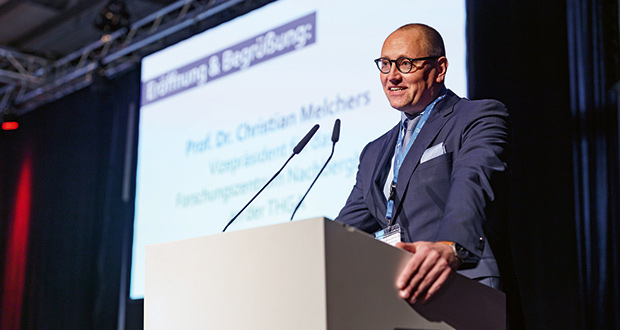Mine water, risk management, monitoring – when mining ends, it leaves behind a variety of tasks. How to deal with them responsibly was the focus of the 21st Altbergbaukolloquium from 9th to 10th November 2023 on the grounds of the UNESCO World Heritage Site Zeche Zollverein in Essen/Germany. Around 500 experts from all over Germany came together at the site, which is steeped in industrial history, to exchange ideas in the fields of geotechnics, mine surveying, mining, geology and civil engineering. The main focus was on the important question: What will the future look like after mining? This time, the symposium was hosted by the Research Center of Post-Mining (FZN) at the TH Georg Agricola University (THGA), Bochum/Germany. “The colloquium on post-mining is one of the most important exchange formats for experts who deal with post-mining tasks and see them as an opportunity,” said Bärbel Bergerhoff-Wodopia, Member of the Board of the RAG-Stiftung, at the opening of the conference. “Scientific support for the technical processes of post-mining and well-trained specialists in this field are essential if the Ruhr region and mining areas around the world are to become regions worth living in.” “The steady decline in the extraction of fossil fuels is focussing on the phasing out of mining and the resulting tasks of the post-mining era,” added Heinrich Böckelühr, District President of the Arnsberg district government. “Examples include the planned increase in mine water in the state’s hard coal fields and the reutilisation of former mining areas for the further development of North Rhine-Westphalia as an industrial state. This also includes the expansion of geothermal energy and underground storage.” The Zollverein UNESCO World Heritage Site was therefore deliberately chosen as the venue for the conference. “It is an important landmark and identity creator for the entire region,” says Prof. Christian Melchers, Head of the FZN (Figure 1). “There are numerous opportunities here to explore the legacy of mining and develop innovative ideas for former mining regions. And for us as researchers, it is even an oversized real laboratory.” The FZN is currently carrying out several projects on the former colliery site. The colloquium’s varied programme of presentations also showed how application-oriented the current research topics are. The topics included the sustainable handling of mine water, increasing digitalisation in old and post-mining, the influence of climate change and specific remediation concepts for old shafts, spoil tips and entire industrial plants. (THGA/Si.)

Fig. 1. Prof. Christian Melchers, Head of the Research Center of Post-Mining (FZN) at the TH Georg Agricola University (THGA) at the opening of the 21st Altbergbaukolloquium at the Zollverein Coal Mine. Photo: THGA


